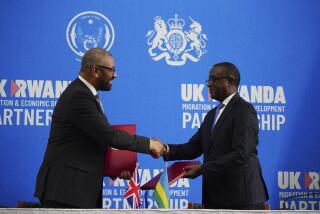Pact Signed for Tunnel Under English Channel
- Share via
CANTERBURY, England — Britain and France signed a treaty Wednesday for construction of a multi-billion-dollar rail tunnel under the English Channel.
British Prime Minister Margaret Thatcher and French President Francois Mitterrand met at Canterbury Cathedral 12 miles from the channel for the signing ceremony.
Calling the treaty historic, Thatcher said its signing “has brought to the brink of fruition a project that has challenged engineers, entrepreneurs and governments on both sides of the channel for generations.”
Mitterrand said “we are finally beginning” after years of talks and plans about a link between the two nations--a project Napoleon dreamed of nearly two centuries ago.
Three weeks ago in Lille, France, Thatcher and Mitterrand announced a twin-bore railway tunnel scheme as their choice for the fixed link across the channel, which is 21 miles wide at its narrowest point. The project has been budgeted at $3.3 billion in current dollars, but the actual cost is expected to double because of interest and inflation.
Other proposals had included a six-lane suspension bridge and a road tunnel.
The Anglo-French consortium of private companies in the tunnel project hopes to begin work next year once the parliaments on both sides of the channel give their approval.
A British Foreign Office statement said, “The treaty’s purpose is to demonstrate the governments’ commitment to the project,” which will be privately financed, and to begin addressing some of the practical details such as safety measures and environmental protection.
Canterbury was chosen for the signing because of its location in the southeastern England county of Kent, the area of England most directly affected by the tunnel. Canterbury Cathedral, parts of which date to the 11th century, also offered a suitably historic setting.
Plans call for the tunnels to be used by conventional trains as well as a special rail shuttle that would carry autos and other vehicles. When the tunnel is completed, it is designed to eventually cut the travel time from London’s Waterloo Station to Paris’ Gare du Nord from the current minimum of five hours to 3 1/2 hours.
Some residents living near the tunnel terminus site on the English side, 12 miles southeast of Canterbury at Cheriton, oppose the project on environmental grounds. About 200 of them protested outside the cathedral during the ceremony.
More to Read
Sign up for Essential California
The most important California stories and recommendations in your inbox every morning.
You may occasionally receive promotional content from the Los Angeles Times.













